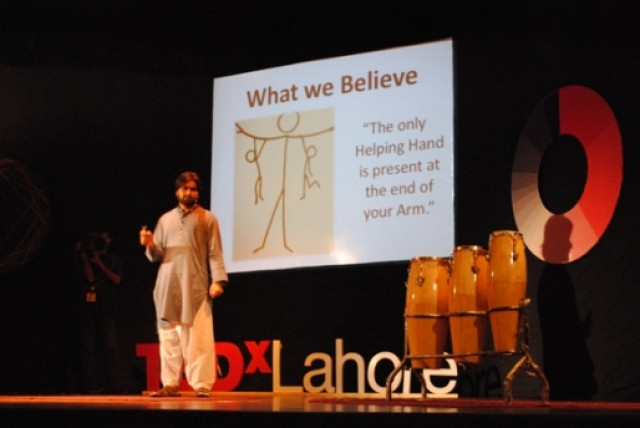This week, the city of Lahore got under my skin. It wasn’t just the idiosyncrasies and beauty of the city that crept into my resolutely Karachi-heart, but the people that I was able to meet. I was attending TEDxLahore, and in the lead up to the conference on July 31, I tagged the team for three days, meeting a rag-tag group of individuals from various backgrounds who had little in common besides their unwavering belief in the ideas they wanted to present to Lahoris (and Pakistanis) via the TEDx platform.
In the absence of local arenas to showcase developing research, social or philanthropic projects, burgeoning talent or the work of individuals making a difference in their respective fields, TEDx provided the perfect platform to celebrate and honour the work of Pakistanis who, as the team put it, “are the silent movers and shakers who may not have always been in the spotlight but who haven’t stopped working for what they believe in nonetheless.”
Ideas worth spreading
The first TEDx conference in Pakistan was held in Lahore in 2009 and this year, curator Asim Fayaz (its rather befitting that he’s a mere 21 years old) and his team were determined to bring the TED mantra of ‘ideas worth spreading’ back to the city in an even bigger way.
Fourteen speakers came together in acknowledgement of ‘collective genius’ – ranging from a musician (the inimitable Noor Zehra, who stunned the audience with the sagar veena or ‘ocean of sound’), economist, linguist, two digital cartographers and an urban planner to an architect, a cycling fanatic, corruption buster, a former-extremist-turned-peaceful-activist and a man who models suicide bomb blasts. The common thread? These men and women have consistently plugged away at their ideas, despite the manifold challenges facing them as Pakistanis.
Not all of them are the ‘usual suspects’ (as Khurram Siddiqi, in charge of Speaker Facilitation, put it) who’s talks can pull in the crowds (such as, for example, Mr. Arif Hasan) or who’s work has been lauded at international conferences. While some speakers enjoyed the benefits of local and international organizational or government support, others, such as Mudasir Zia, a graduate of the University of Engineering and Technology Lahore, struck out alone. Mr Zia, with a little help from his friends, founded and now teaches at an English medium free school, organises blood-donor drives, solid waste management projects and financial aid and education for girls amongst many other projects.
A blast of inspiration
The speaker who undeniably stole the show, Dr Zeeshan Usmani, works on the ‘simulation and modeling of blast waves in open and confined spaces.’ The audience was not prepared for a highly energetic man who stumbled over his words in a frenetic effort to present as much of his remarkable project as possible within the 12 minute timeslot. Dr Usmani has meticulously researched and analysed the detritus (including stacks of government records and testimonies) from suicide blasts in order to create a software that can simulate suicide attacks while also forensically mapping out an intricate web of the attacker’s fingerprints all over the scene.
Pulling up a blue-print of Ali Auditorium, the venue of the conference, Dr Usmani’s programme drew grimaces from the audience as he showed us what a potential attack at the venue could look like, complete with a photograph of a victim based on his proximity to the hypothetical bomber. While this may sound morbid, it is important to consider the impact of such research on emergency planning, disaster management and relief efforts in the wake of a bombing, not to mention investigative efforts.
A sign of things to come
During a quick break between speakers, many in the audience commented on the glitches the organizers were facing with the audio system and the inability of certain speakers to grip the audience. This is not a reflection on their work or ideas, but speaks of the high level of regard and expectation the audience had for an event of this nature and one with a rigorous application process for attendees. What we need is a busy calendar of such events in order to create not just appreciative audiences but platforms for the thousands of Pakistanis who continue to forge paths in their fields despite the myriad challenges facing them.
Kudos to the organisers for giving each attendee a tree sapling in their goodie-bags – I’ll never forget walking back into the auditorium to see a swathe of green dotting the red and blue seats. Lahore is all the more rich with gulmohars and rose trees this week – and I hope I’m able to return soon to see how my tree, planted in my aunt’s garden, is growing.
The common thread of genius at TEDx
TEDxLahore provided the perfect platform to celebrate and honour the work of Pakistanis who may not have always been in the spotlight.



COMMENTS
Comments are moderated and generally will be posted if they are on-topic and not abusive.
For more information, please see our Comments FAQ